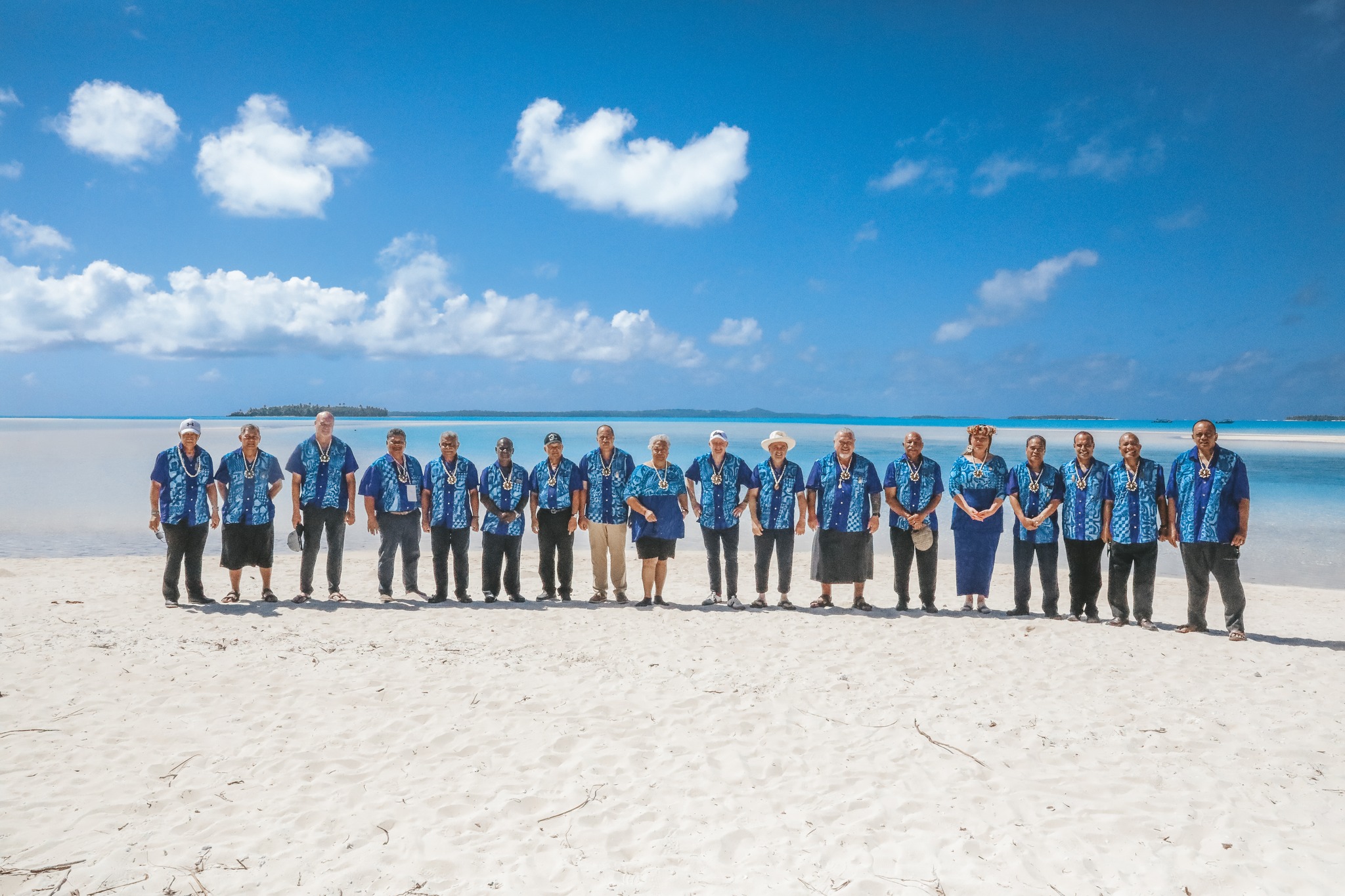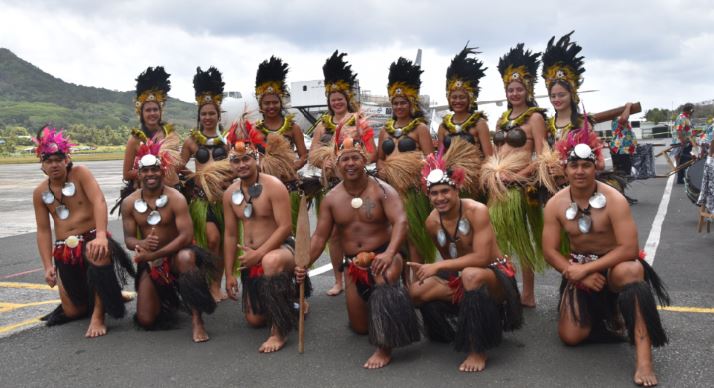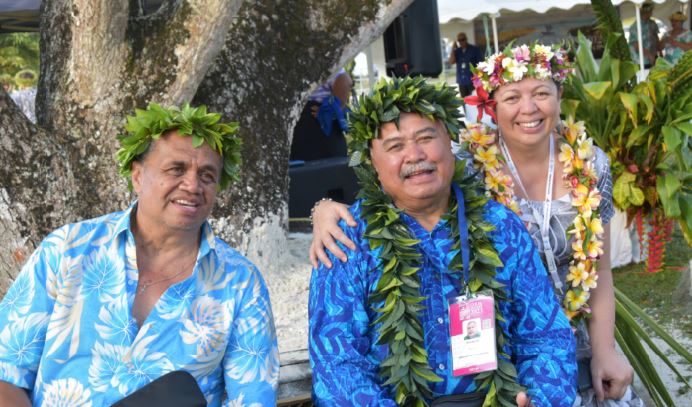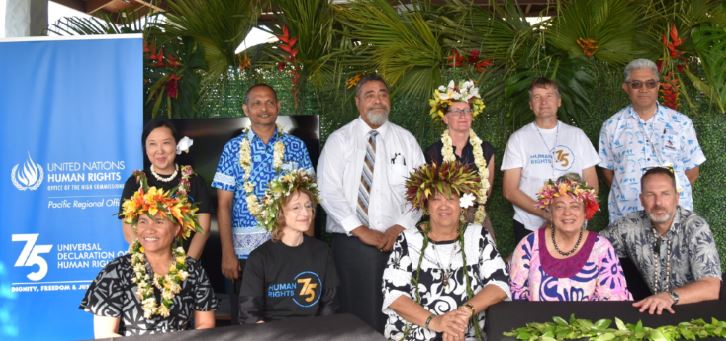Cook Islands community delivers ‘impressive setup and hospitality’ for 52nd PIF Leaders’ Meeting: A ‘very beautiful’ event
Saturday 11 November 2023 | Written by Supplied | Published in Art, Features, National, Pacific Islands Forum, Weekend

Pacific leaders pose for a group photograph on One Foot Island after attending the Leaders’ Retreat during the Pacific Islands Forum at Aitutaki on Thursday. Picture: MFAI/ 23111001
Though leaders from the region did not agree on all the matters they discussed during this week’s Pacific Islands Forum Leaders Meeting, there’s one thing no one disputes: the people of the Cook Islands staged a spectacular event, writes Rachel Reeves.
During a press conference on an Aitutaki beach Thursday evening, Tonga’s prime minister, Hu’akavemeiliku Siaosi Sovaleni, remarked on the “impressive setup and hospitality” he saw this week, noting the meeting sets a high bar for Tonga, which will host next year’s Forum leaders’ meeting.
“(We are) actually seeing what we can do in terms of learning from what Cook Islands has done,” he said, offering his congratulations to the host country for a “very beautiful” event.
The beauty was perhaps best demonstrated by Monday night’s opening ceremony – an explosion of colour and culture attended by two thousand spectators from around the region and world.
The effort that went into the ceremony was apparent in the details: enormous flower arrangements, maire ei, printed banners, a green carpet of leaves leading into the Auditorium. It was evident in larger ways, too: a specially produced video showcasing Pacific culture, a feast of Cook Islands proportions, a 200-person production for which drummers and dancers spent months rehearsing.

The opening ceremony of the Pacific Islands Forum Leaders Meeting at Te Are Karioi National Auditorium. MELINA ETCHES/23111078
Nearly 800 people arrived for the Forum this week, aboard passenger planes and chartered jets and military aircraft. They included leaders of nations that belong to the Pacific Islands Forum and their delegations (some of which comprised more than 20 people), representatives of partner and observer nations, regional agencies, and donor organisations.
Others, who were not directly involved in Forum discussions but interested in the region, from hedge fund managers to Indigenous activists, attended also. The President of the United Nations General Assembly participated for the first time in the Forum’s 52-year history.
‘The organisers were sleepless’
The Forum Leaders’ Meeting was preceded by four solid months of planning, according to members of the organising team known as the “core team”.
Planning began in earnest in June, when leaders of countries belonging to the Forum approved what became known as the Suva Agreement, which intended to reunite the organisation after a rift wrought by the issue of who should be the organisation’s secretary-general.
From then on, a team headed by the secretary of foreign affairs, Tepaeru Herrmann, hit the ground running and didn’t stop running until last night when the Forum officially ended.
Partners such as Australia, New Zealand, and the People’s Republic of China offered financial support to defray costs, freeing the core team to focus on planning to host 650 delegates and 80 media personnel.

The Akirata Cultural Dance Troupe greeted every Leaders at the Rarotonga International Airport. MELINA ETCHES/23111079
Still, the team was small and the workload was large.
“We had to deliver business as usual – that doesn’t go on pause while you plan to prepare for the hosting, and you’re running a very small workforce,” Herrmann said. “Our programme speaks to very small but very connected workforce, predominantly volunteers, but also public servants who have been seconded who understood what the brief was and just pushed ahead.”
There were processes to follow around inviting special guests, such as Saudi Arabia, whose government committed $50 million to the region. There was a theme to choose; the team reviewed a half-century’s worth of themes from Forum leaders’ meetings, agonised over options, then settled on “Our Voices, Our Choices, Our Pacific Way: Promote, Prosper, Partner”. MFAI’s policy team attended meetings with teams from all nations belonging to the Forum.
MFAI’s logistics team, led by Amelia Fukofuka-Murare, took the lead in coordinating such logistics as travel, accommodation, security, catering, transportation, communication, medical support, registration, and accreditation.
“The hours were crazy,” said Josh Baker, who was part of the core team. “A lot of sleepless nights. I’m so proud of our Cook Islanders who dedicated their time and their energy and their love toward amplifying the Pacific Islands Forum.”
“The organisers were sleepless,” agreed Sosikeni Lesa of SPREP (Secretariat of the Pacific Regional Environment Programme), who led communications for the event.

Pacific Islands Forum Leaders Meeting welcoming ceremony in Aitutaki. From Left: Cook Islands Thomas Peyroux and Maki Karati flew in from New Zealand to help with communications, and Ministry of Foreign Affairs and Immigration (MFAI) – Tepaeru Herrmann. MELINA ETCHES/23111047
Other arms of the Cook Islands government also did their part.
Te Marae Ora conducted a tutaka the week before the Forum, ensuring yards were tidy and rubbish was raked. The Ministry of Internal Affairs arranged for trees to be trimmed. Te Aponga Uira strung coloured streetlights around town. The Cook Islands Police rehearsed its motorcade ahead of the leaders’ arrival and attended security training to become “close protection officers”, or CPOs.
Cook Islanders not affiliated with the public service contributed to the planning of the Forum, too.
“I can’t say thank you enough to the number of government agencies, but also community groups, volunteers, even private sector entities, who stepped up,” Herrmann said. “Everyone came on board.”
TAV made custom uniforms for leaders. Drivers practiced their routes. Punanga Nui vendors brought their best: akari pi from Mauke, rito craft from Tongareva, pearls from Manihiki, chutneys from Atiu, produce from Rarotonga.
Lesa, who has attended many Forum leaders’ meetings, was particularly struck by how much of the Cook Islands community participated in the planning and execution of government’s vision.
“Every country that hosts a Forum puts extra effort into making sure it’s successful, but what stands out for me was the community involvement,” he said. “How people came together during that opening ceremony – that would be easily the highlight for me.”
Alongside the formal programme of discussions and meetings, the core team also ran what Herrmann calls an “informal programme”, centred mostly around the Punanga Nui marketplace. This week the area was transformed into a “pavilion”, where a range of organisations set up booths to highlight their work, such as providing insurance for disasters, supporting the transition to renewable energy, educating Pacific Islanders, preserving culture, and adapting to the impacts of climate change. Each booth correlated with a discussion being held amongst leaders.

Welcoming guests at the opening ceremony of the Pacific Islands Forum Leaders Meeting with ei maire at Te Are Karioi National Auditorium. MELINA ETCHES/23111078
“The pavilion started off as sort of a little idea a few months ago, and then it turned into the carnival that we hoped it would be,” Herrmann said. “What we were really trying to do there is collide leaders with grassroots, with our communities, and the Punanga Nui was the perfect manifestation of that.”
Born after the destruction of Cyclone Sally, the Punanga Nui market has for three decades been fostering entrepreneurship and allowing people to support their families, including during the Covid-19 pandemic that halted tourism.
There were side events at the pavilion, too, which provoked engaging conversations amongst panelists and featured presentations about work being done in various areas, including deep-sea research, plastic pollution, and management of the high seas.
The result of months of planning and coordination was a flawless Forum, easy for visitors to navigate and memorable for everyone involved. Attending the Forum as a reporter in 2023 was a different experience from attending the Forum as a reporter in 2012, which was the last time the Cook Islands hosted the event. A team took care of the media delegation, convening press conferences, sending daily email updates, and providing outlets and office space. There was access to free Wi-Fi at every Forum-related location.
“In the Pacific, it’s such a challenge to host these events because of the manpower, the resources, the finances, the skills and expertise on the ground required – that’s all a challenge,” Lesa said. “Everybody really pulled together.”

The Universal Declaration of Human Rights' 75th anniversary, a Dialogue side event on the value people-centred development. MELINA ETCHES/23111071
On the issues
Though this week’s meeting laid bare some fissures in the fabric of the Forum, most leaders spoke about the value of solidarity and unity across the Pacific illustrated during this week’s meeting.
UN General Assembly President Dennis Francis said during a press conference that “we have to work together to unify all positions in order to address the challenges we face”. Pacific Islands Forum Secretary-General Henry Puna talked at Wednesday’s plenary session about how solidarity is “key to capitalising on … opportunities and overcoming shared complexities”. At the opening ceremony, Prime Minister Mark Brown catalogued the challenges of the current historical moment and said: “More than ever, we must stand united, work collectively, to ensure the security and prosperity of our people.”
Leaders did negotiate, reach, and sign agreements this week pertaining to gender equality, stamping out corruption, climate financing and mobility, and safeguarding the region against nuclear threats.
They agreed on the document that will shape the region’s policy through 2050, as well as the document that will shape the relationship between the European Union and African, Caribbean, and Pacific countries. They agreed on who would represent the region at COP28, the international climate conference in Dubai later this month.
But while their discussions were centred on collaboration and cooperation, they were sometimes hamstrung by differences, such as loyalties to and relationships with such players as China and Japan or approaches to ocean management.
Nauru’s president, David Adeang, walked out of a meeting over the selection of the Forum’s next secretary-general, which leaders agreed Thursday will be Nauru’s former president Baron Waqa. Adeang did not attend the leaders’ retreat on Aitutaki, at which various agreements were signed.
Some leaders voted against a humanitarian resolution between Israel and Gaza; others, including the Cook Islands, voted in favour; still others remained silent. Leaders also disagreed on the issue of Japan’s intent to release a million tonnes of nuclear wastewater into the Pacific Ocean, as well as on the acceleration of efforts to mine the deep sea.
While the Cook Islands government gifted a deep-sea nodule encased in a miniature vaka to every visiting leader and invited the Seabed Minerals Authority, as well as companies licensed to explore the country’s waters for nodules, to speak at the pavilion, not all Forum members are supportive of deep-sea mining, at least in the way it’s being presently approached.
“You know, one thing that we share as Pacific Islands, is we share one ocean,” Palau’s president, Surangel Whipps Jr., said before a Tuesday night screening of “Deep Rising”, a documentary about the risks of deep-sea mining narrated by Hollywood actor Jason Momoa. “And that one ocean we share, we may be doing something over here, but it impacts our neighbour, impacts all of us.” His country supports a moratorium, or precautionary pause, on mining.
During a press conference after Thursday’s leaders’ retreat on the Aitutaki lagoon, Prime Minister Brown acknowledged the disagreements among leaders this week and framed them as positive.
“There are some issues where collectively we are very, very able, very strong and manage certain issues very well, and fisheries is a good example of that,” he said. “There are issues where we have a divide in our positions. And rather than viewing that as a weakness in our organisation, I see it as a strength in each country being able to take a position and stand on their position without having to rely on others to follow it. So in that regard, that diversity is one of (the Forum’s) strengths.”
‘For whom they toil’
Despite differences of opinion on specific issues, this week’s Forum leaders’ meeting represented a reunification of what was recently a fractured organisation. Part of the Cook Islands government’s vision for this event, Herrmann explained, was to create a space for leaders to come together to remember and honour “those for whom they toil”, she said: the people of the Pacific.
She expressed gratitude for the government’s “confidence in what is a pretty small team being able to take the political aspirations, turn it into a vision, and then corral the nation behind that vision and that aspiration and deliver it as a truly national delivery involving so many Cook Islanders, be they the teams marking the roads in the sprint leading up to the forum, be they the mamas who have been busy handicraft making, or those looking after the delegates. It’s been a truly humbling experience, the manner in which our people have just embraced the vision. And we know it will serve the Pacific well, what we have delivered, because we see it and how the leaders who were – let’s not forget – broken and fractured and have now pulled together strongly.”
For Herrmann, the Forum was special for attendees but also impactful on a wider scale, given the attention paid by regional and international media outlets.
“I think it’s affirming to see the Internet explode with Pacific voices showcasing Pacific choices in a uniquely Pacific way … The more voices that go out there with Pacific faces that have Pacific lens and how they see the world, I think, the more enriched the world will be,” she said.














































